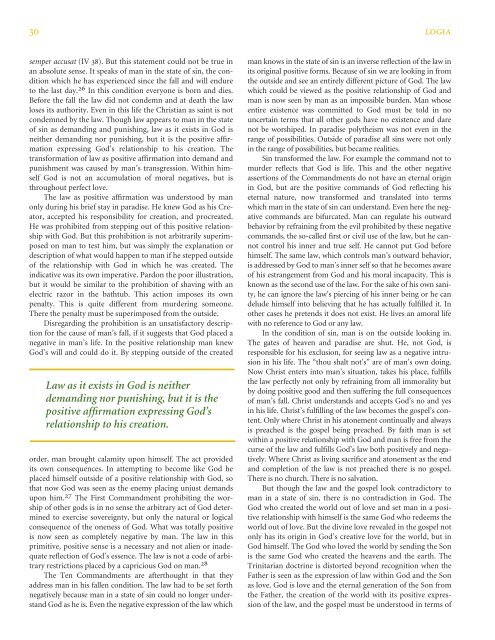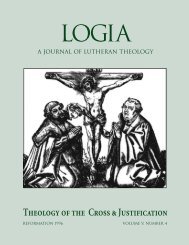03-1 Pastoral Care.pdf
03-1 Pastoral Care.pdf
03-1 Pastoral Care.pdf
- No tags were found...
Create successful ePaper yourself
Turn your PDF publications into a flip-book with our unique Google optimized e-Paper software.
30 LOGIAsemper accusat (IV 38). But this statement could not be true inan absolute sense. It speaks of man in the state of sin, the conditionwhich he has experienced since the fall and will endureto the last day. 26 In this condition everyone is born and dies.Before the fall the law did not condemn and at death the lawloses its authority. Even in this life the Christian as saint is notcondemned by the law. Though law appears to man in the stateof sin as demanding and punishing, law as it exists in God isneither demanding nor punishing, but it is the positive affirmationexpressing God’s relationship to his creation. Thetransformation of law as positive affirmation into demand andpunishment was caused by man’s transgression. Within himselfGod is not an accumulation of moral negatives, but isthroughout perfect love.The law as positive affirmation was understood by manonly during his brief stay in paradise. He knew God as his Creator,accepted his responsibility for creation, and procreated.He was prohibited from stepping out of this positive relationshipwith God. But this prohibition is not arbitrarily superimposedon man to test him, but was simply the explanation ordescription of what would happen to man if he stepped outsideof the relationship with God in which he was created. Theindicative was its own imperative. Pardon the poor illustration,but it would be similar to the prohibition of shaving with anelectric razor in the bathtub. This action imposes its ownpenalty. This is quite different from murdering someone.There the penalty must be superimposed from the outside.Disregarding the prohibition is an unsatisfactory descriptionfor the cause of man’s fall, if it suggests that God placed anegative in man’s life. In the positive relationship man knewGod’s will and could do it. By stepping outside of the createdLaw as it exists in God is neitherdemanding nor punishing, but it is thepositive affirmation expressing God’srelationship to his creation.order, man brought calamity upon himself. The act providedits own consequences. In attempting to become like God heplaced himself outside of a positive relationship with God, sothat now God was seen as the enemy placing unjust demandsupon him. 27 The First Commandment prohibiting the worshipof other gods is in no sense the arbitrary act of God determinedto exercise sovereignty, but only the natural or logicalconsequence of the oneness of God. What was totally positiveis now seen as completely negative by man. The law in thisprimitive, positive sense is a necessary and not alien or inadequatereflection of God’s essence. The law is not a code of arbitraryrestrictions placed by a capricious God on man. 28The Ten Commandments are afterthought in that theyaddress man in his fallen condition. The law had to be set forthnegatively because man in a state of sin could no longer understandGod as he is. Even the negative expression of the law whichman knows in the state of sin is an inverse reflection of the law inits original positive forms. Because of sin we are looking in fromthe outside and see an entirely different picture of God. The lawwhich could be viewed as the positive relationship of God andman is now seen by man as an impossible burden. Man whoseentire existence was committed to God must be told in nouncertain terms that all other gods have no existence and darenot be worshiped. In paradise polytheism was not even in therange of possibilities. Outside of paradise all sins were not onlyin the range of possibilities, but became realities.Sin transformed the law. For example the command not tomurder reflects that God is life. This and the other negativeassertions of the Commandments do not have an eternal originin God, but are the positive commands of God reflecting hiseternal nature, now transformed and translated into termswhich man in the state of sin can understand. Even here the negativecommands are bifurcated. Man can regulate his outwardbehavior by refraining from the evil prohibited by these negativecommands, the so-called first or civil use of the law, but he cannotcontrol his inner and true self. He cannot put God beforehimself. The same law, which controls man’s outward behavior,is addressed by God to man’s inner self so that he becomes awareof his estrangement from God and his moral incapacity. This isknown as the second use of the law. For the sake of his own sanity,he can ignore the law’s piercing of his inner being or he candelude himself into believing that he has actually fulfilled it. Inother cases he pretends it does not exist. He lives an amoral lifewith no reference to God or any law.In the condition of sin, man is on the outside looking in.The gates of heaven and paradise are shut. He, not God, isresponsible for his exclusion, for seeing law as a negative intrusionin his life. The “thou shalt not’s” are of man’s own doing.Now Christ enters into man’s situation, takes his place, fulfillsthe law perfectly not only by refraining from all immorality butby doing positive good and then suffering the full consequencesof man’s fall. Christ understands and accepts God’s no and yesin his life. Christ’s fulfilling of the law becomes the gospel’s content.Only where Christ in his atonement continually and alwaysis preached is the gospel being preached. By faith man is setwithin a positive relationship with God and man is free from thecurse of the law and fulfills God’s law both positively and negatively.Where Christ as living sacrifice and atonement as the endand completion of the law is not preached there is no gospel.There is no church. There is no salvation.But though the law and the gospel look contradictory toman in a state of sin, there is no contradiction in God. TheGod who created the world out of love and set man in a positiverelationship with himself is the same God who redeems theworld out of love. But the divine love revealed in the gospel notonly has its origin in God’s creative love for the world, but inGod himself. The God who loved the world by sending the Sonis the same God who created the heavens and the earth. TheTrinitarian doctrine is distorted beyond recognition when theFather is seen as the expression of law within God and the Sonas love. God is love and the eternal generation of the Son fromthe Father, the creation of the world with its positive expressionof the law, and the gospel must be understood in terms of
















